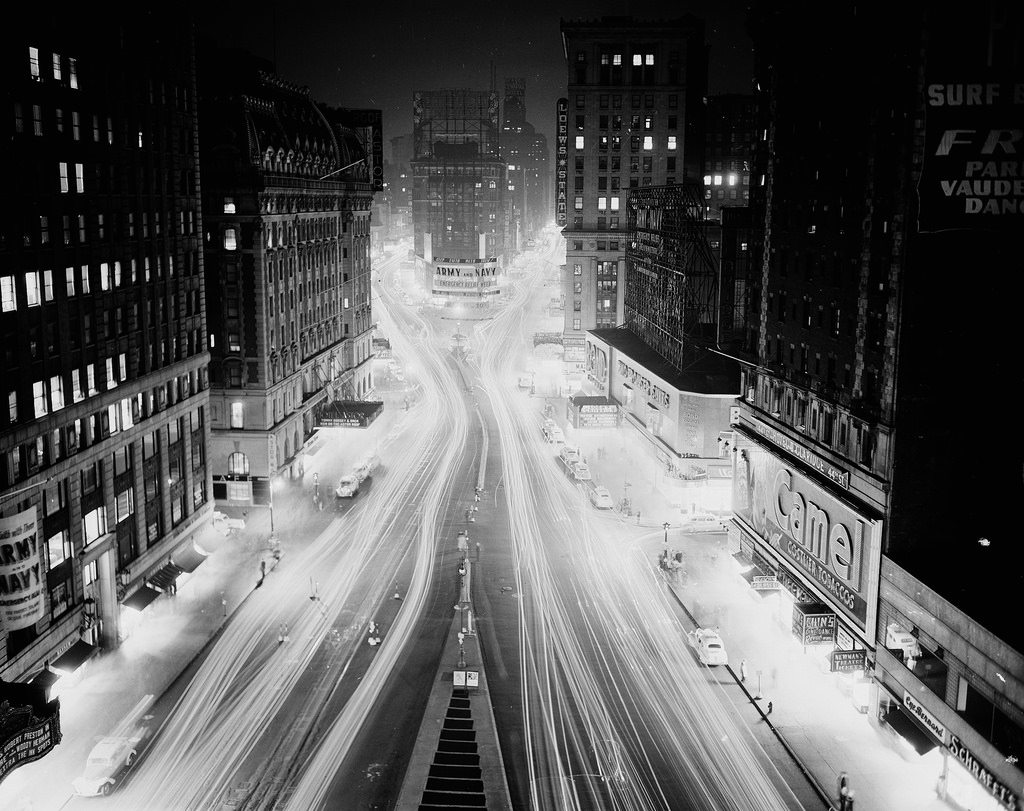
These incredible black and white photographs document everyday life in New York City in the 1940s and offer a glimpse into a long-gone era.
From street peddlers selling fish or fresh ears of corn, to cars stalled under mounds of snow, scenes are both familiar and nostalgic.
The New York City that emerged from World War II was a dramatically different place than the city that had entered it four years before.
The change was in large part due to the war itself, which had finally lifted the city out of the Depression, and ushered in an era of unparalleled prosperity.

A crowd of customers gather at Sloppy Joe’s soft drink stand during a dimout in Times Square, New York, May 21, 1942.
The explosion in commercial activity brought on by the war had reignited the city’s economic engine, carrying it to a level of economic power and dominance like nothing before or since.
By the late 1940s, New York had become the world’s largest manufacturing center, with 40,000 factories and over a million factory workers. It was the nation’s largest wholesaling center, accounting for a fifth of all wholesale transactions in America.
It was the world’s biggest port, handling 40 percent of the nation’s waterborne freight, 150 million tons a year. And it was the world’s financial capital, trading hundreds of millions of dollars each day.
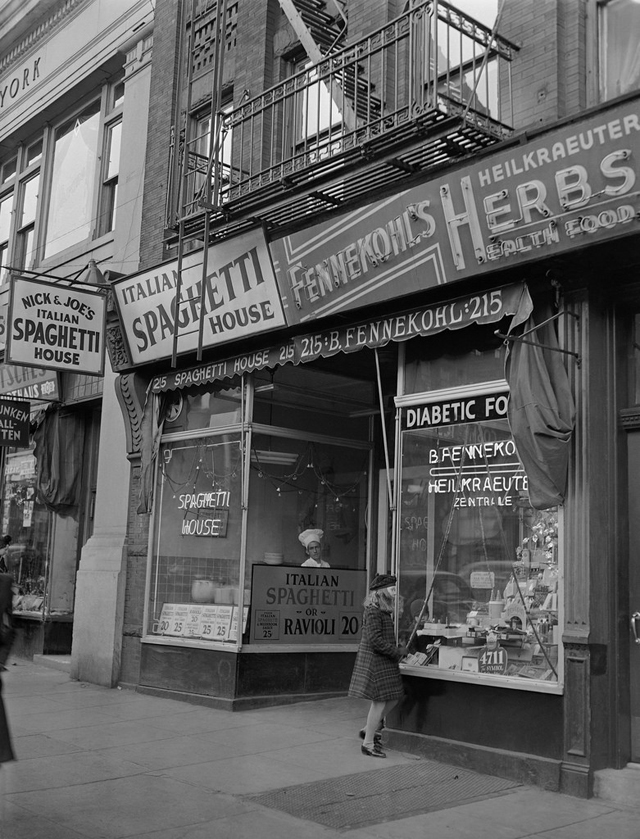
An Italian spaghetti house and a German health food store next to each other on 86th St. in New York, Jan. 22, 1942.
Over 900,000 New Yorkers served in the war and approximately 63 million tons of supplies and more than 3 million men shipped out from New York Harbor.
During the height of the war, a ship left every 15 minutes. Efforts were made to protect New York from attack, during the war famous landmarks such as Times Square and Broadway were dimmed out to protect New York from an air raid.
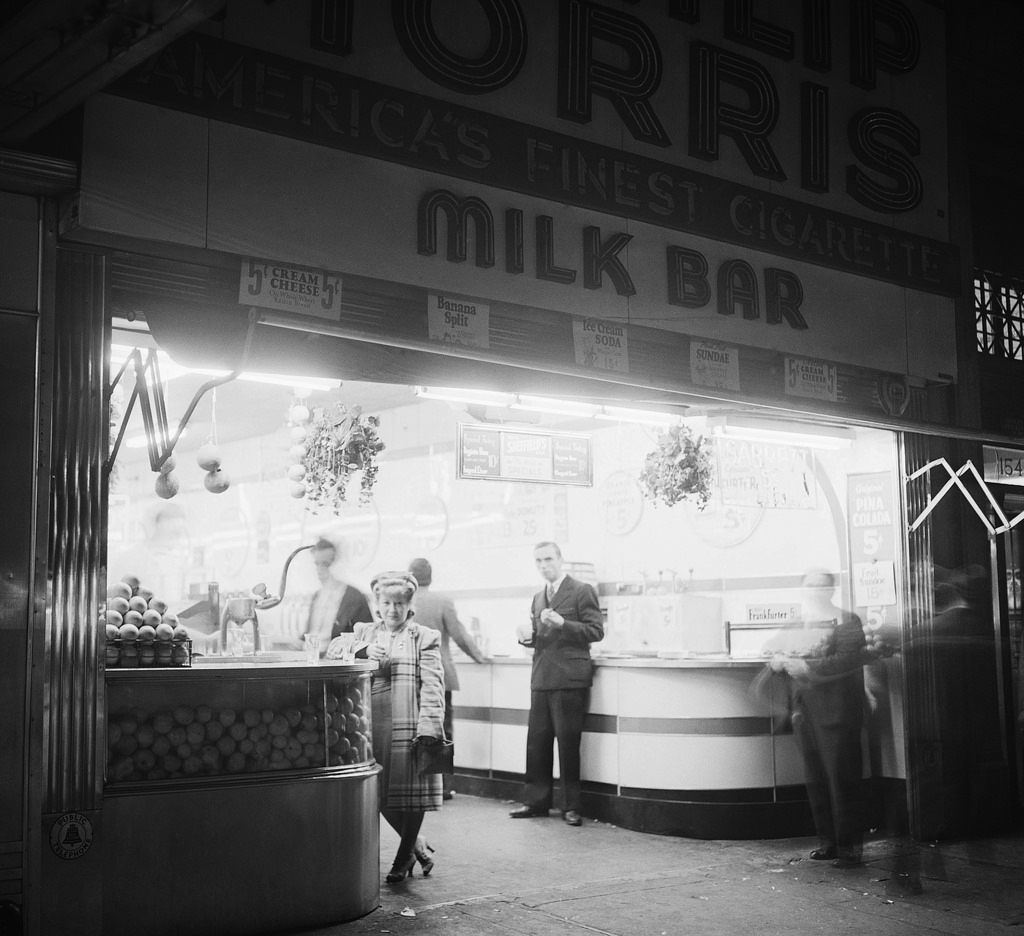
Customers gather at a soft drink stand during a dimout in Times Square, New York, May 21, 1942.
Beverley Nichols, an English writer, described the NYC of 1940s: More than ever before, as the shop windows filed past in a glittering parade, there was the sense of New York as a great international city to which all the ends of the world had come.
London used to be like that, but somehow one had forgotten it, so long had it been since the Hispanos and Isottas had glided down Piccadilly, so many aeons since the tropical fruit had glowed in the Bond Street windows.
Coming from that sort of London to America, in the old days, New York had seemed just, American; not typical of the continent, maybe, but American first and foremost. Now it was the center of the world.
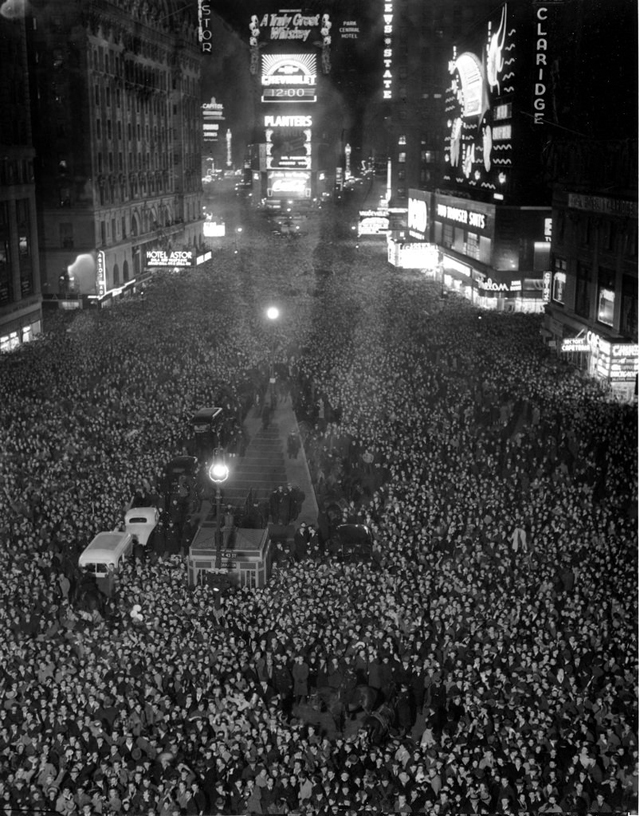
The bright lights of Times Square during the New Year’s Eve celebration, Dec. 31, 1942.
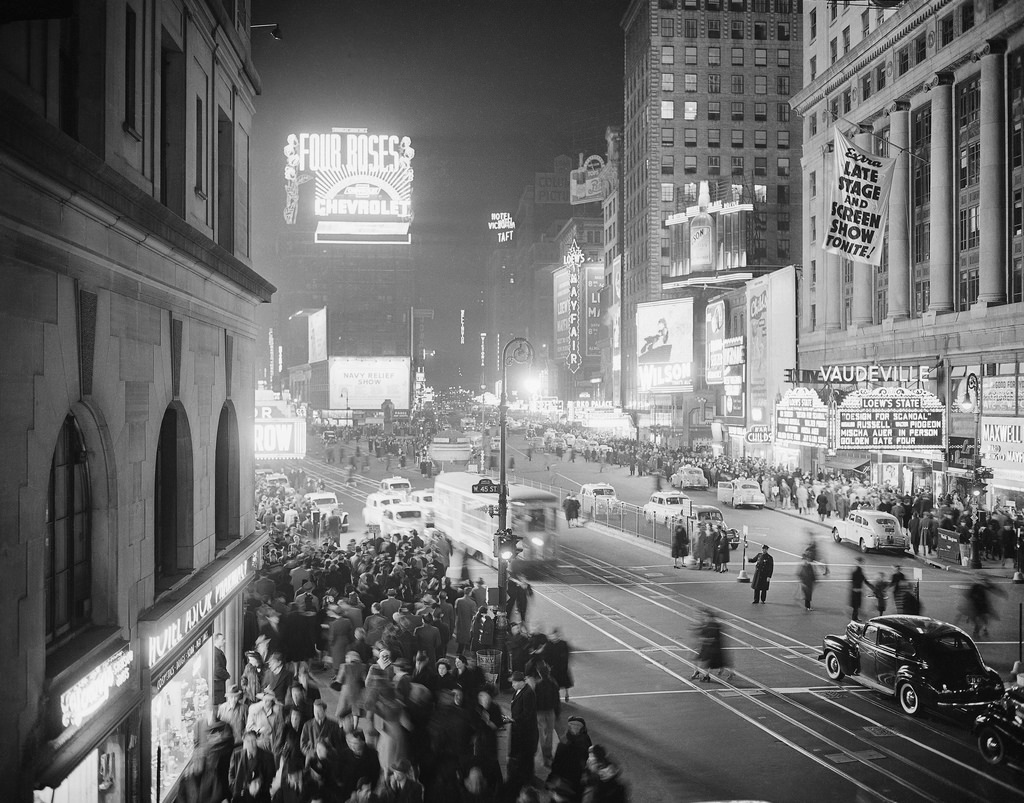
Times Square dimout, New York, March 1, 1942.
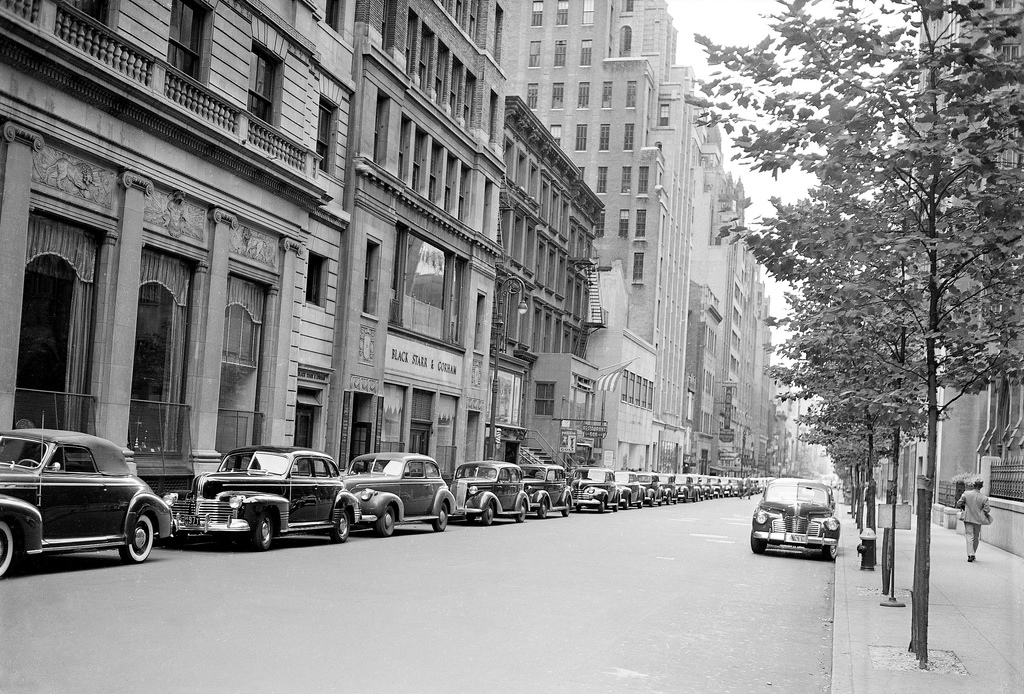
Rows of cars line the curb as a result of free parking over Labor Day weekend in New York City, Sept. 6, 1942.
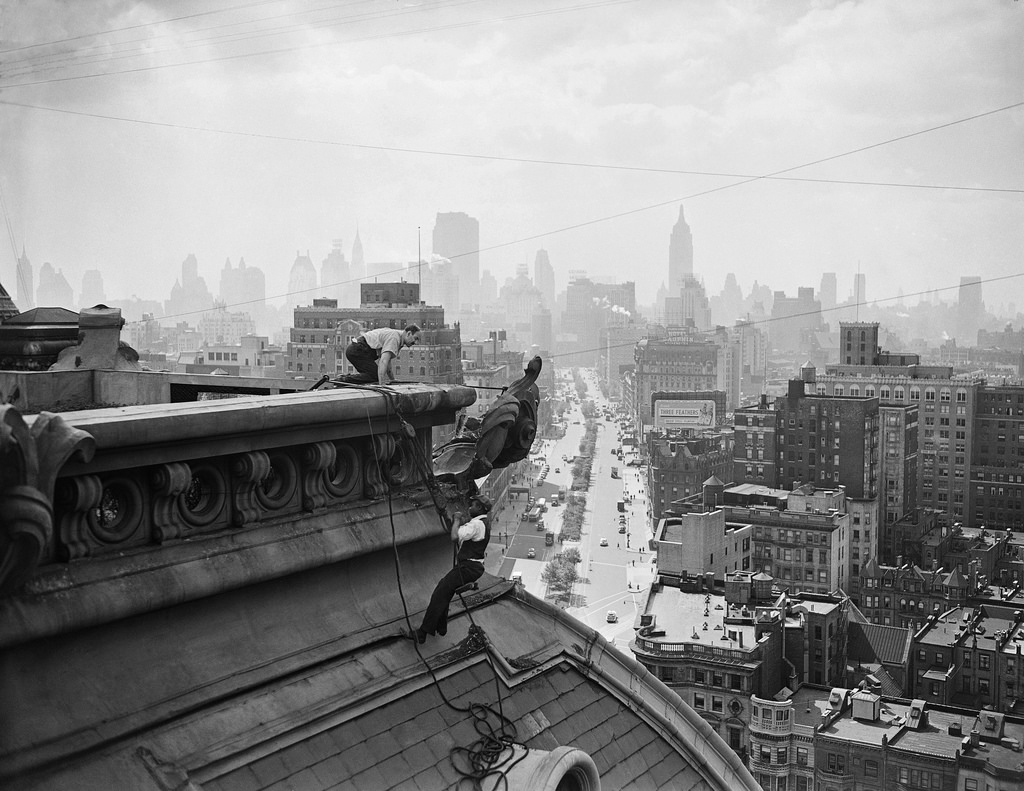
Workmen prepare to lower one of the 100-pound metal cornices from the Hotel Ansonia in New York, Sept. 22, 1942.
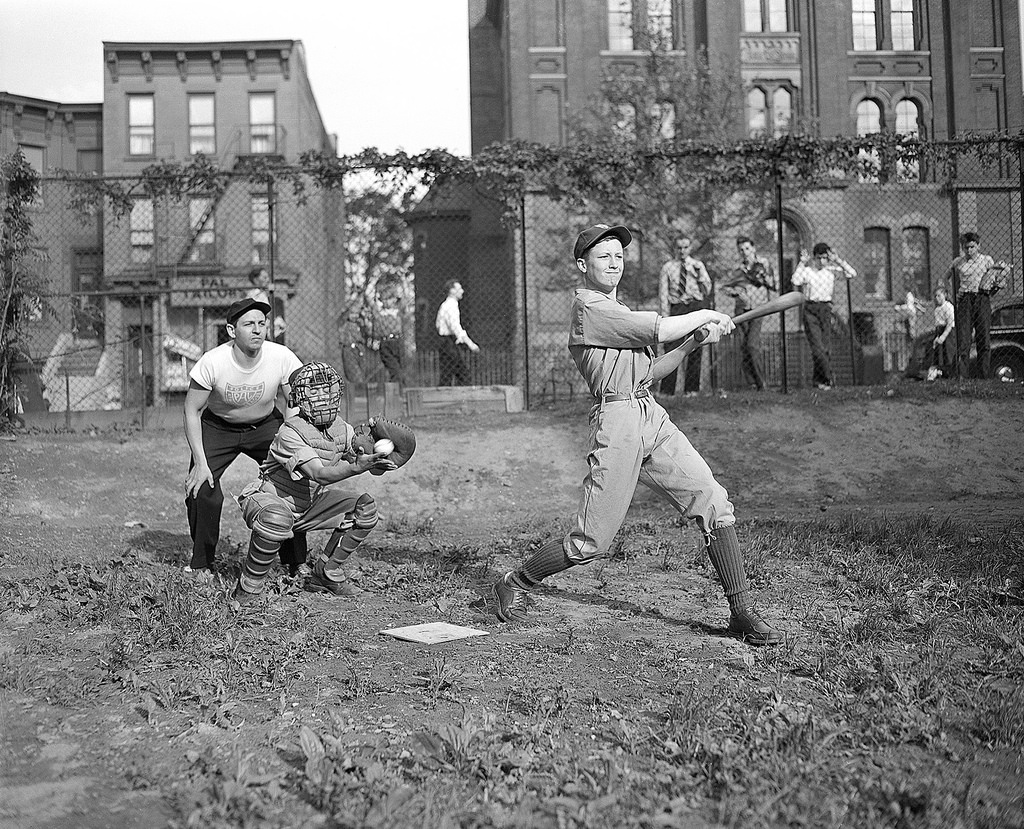
A boy swings and misses at a ball during a practice session in Brooklyn, N.Y., June 9, 1943.
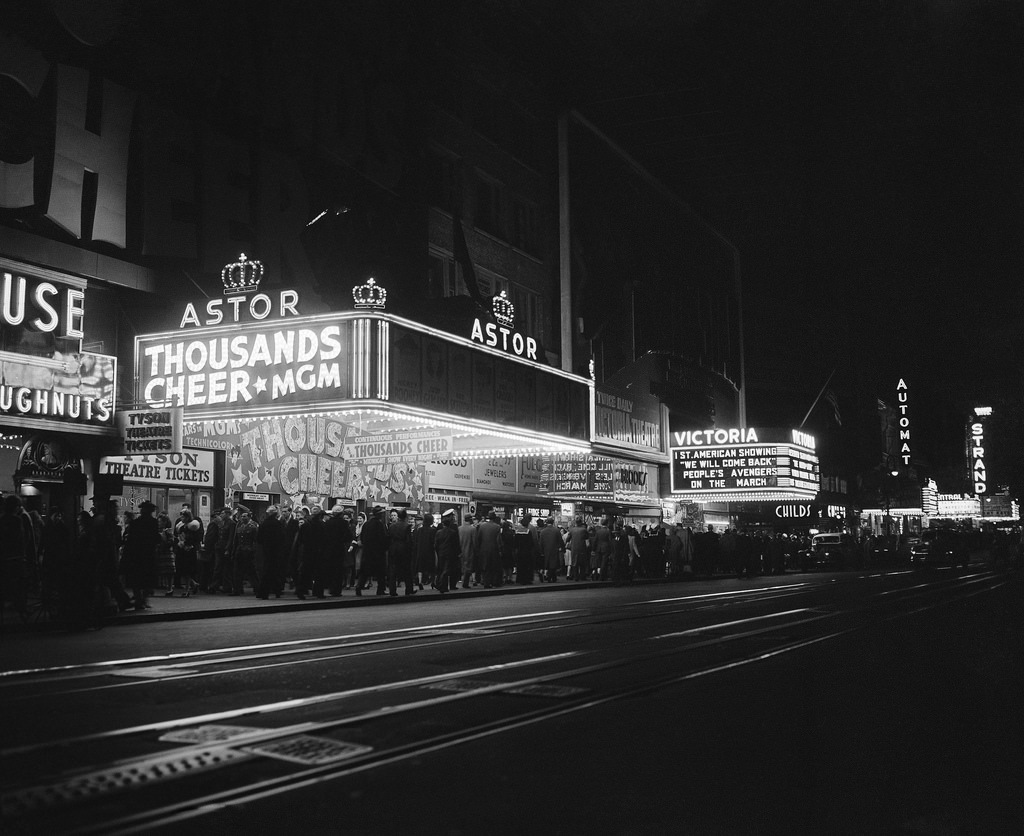
After 18 months in the dark, theater marquees on Broadway light up again while underneath the crowds come out of the dimout gloom in New York, Nov. 2, 1943.
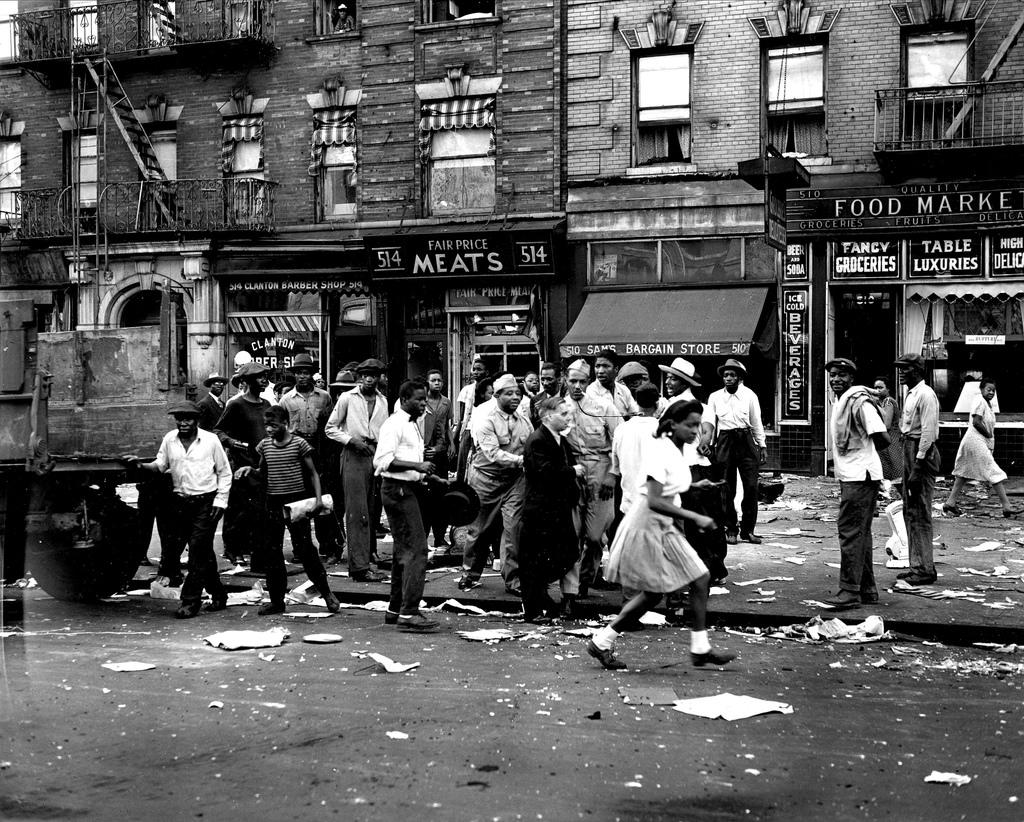
Two black Army soldiers assist a white man who was involved in a scuffle that occurred during the outbreak of a race riot in the Harlem area, Aug. 2, 1943.
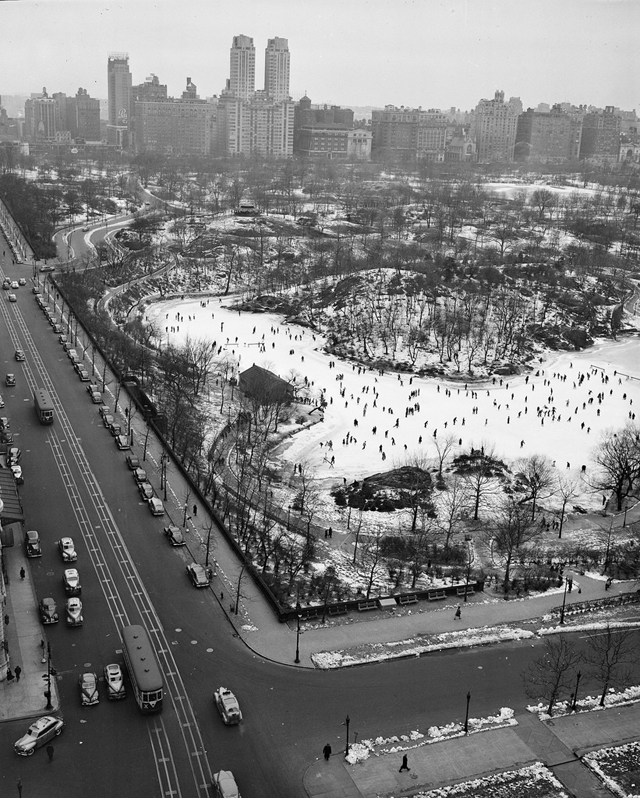
Ice skaters in New York’s Central Park look from the top of the Savoy Plaza Hotel at 59th St. and Fifth Ave., Jan. 9, 1944.
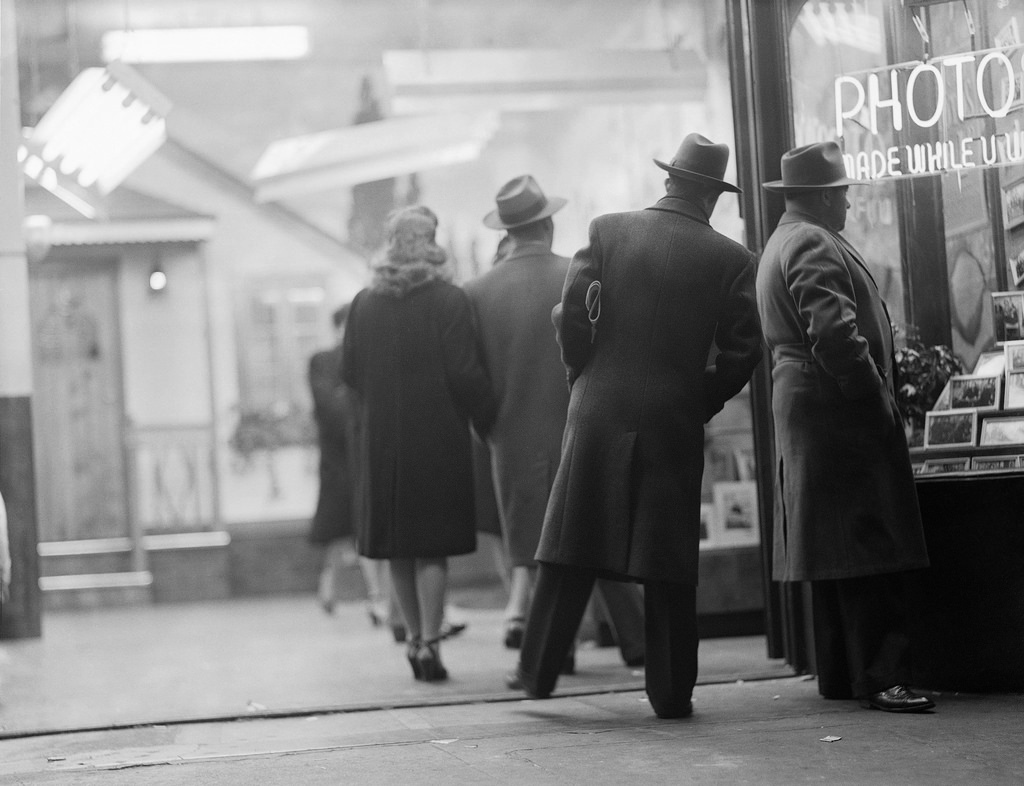
Pedestrians strolling Broadway stop to peek into one of the many photo studios looking for diversion in New York, Dec. 1, 1944.
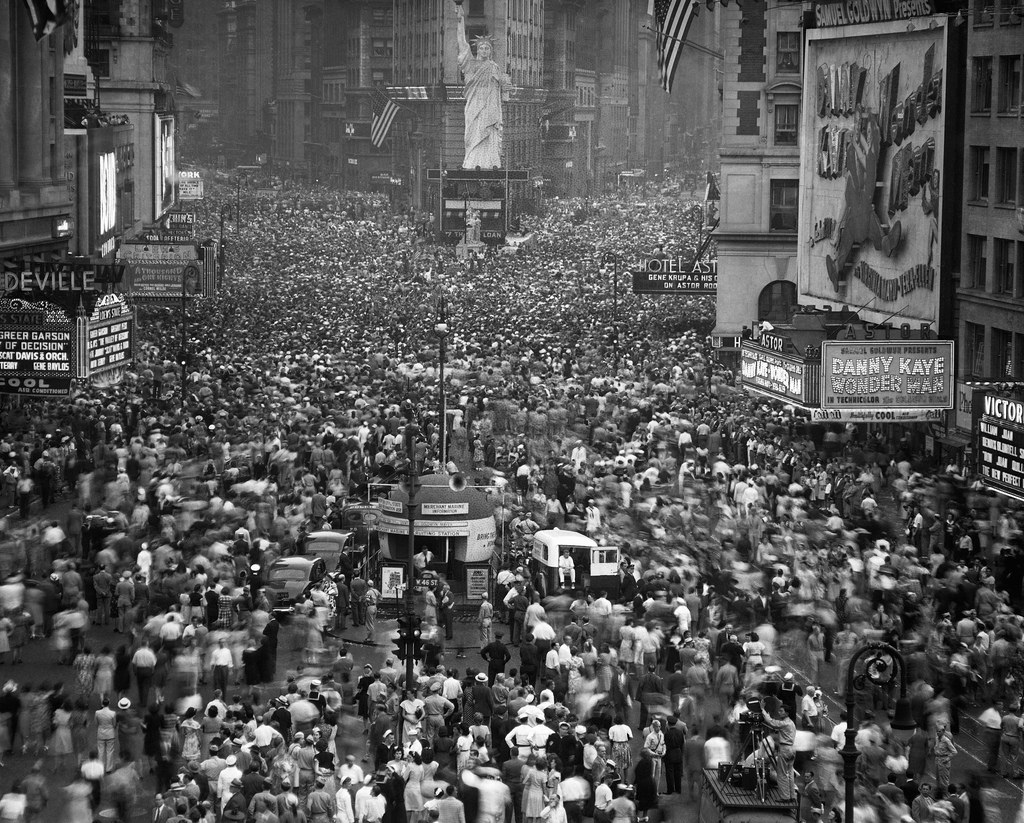
A huge crowd in New York’s Times Square jubilantly welcome the news that the Japanese had accepted the Allies’ terms of surrender on Aug. 14, 1945.

People observing the death of President Roosevelt, the United Nations flags fly at half mast at Rockefeller Plaza, New York, April 13, 1945.
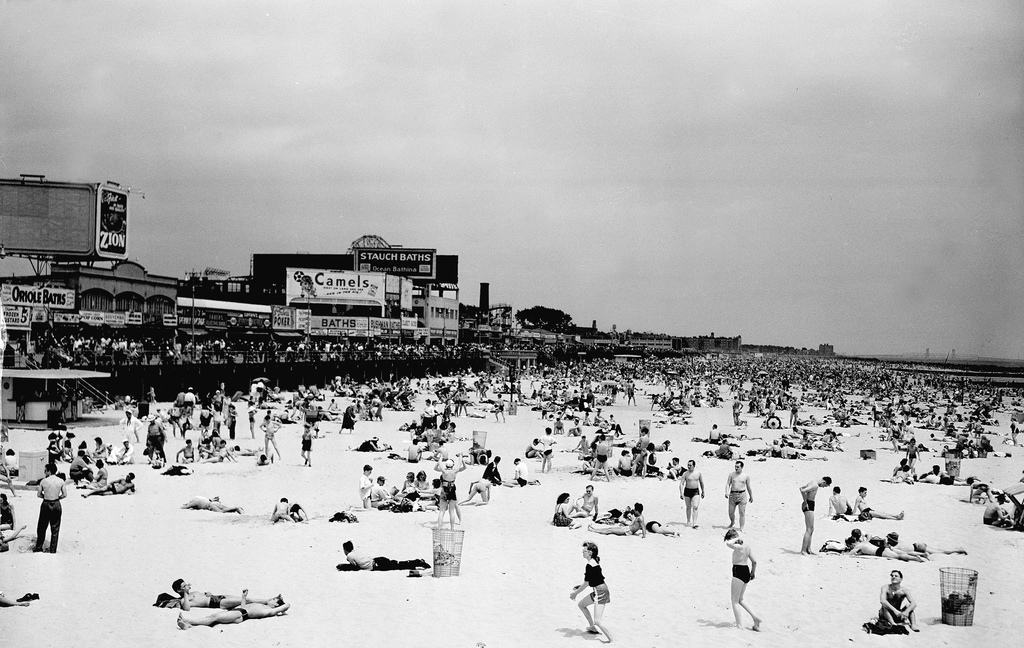
People sunbathe on the beach and walk along the boardwalk at Coney Island in Brooklyn, May 27, 1945.
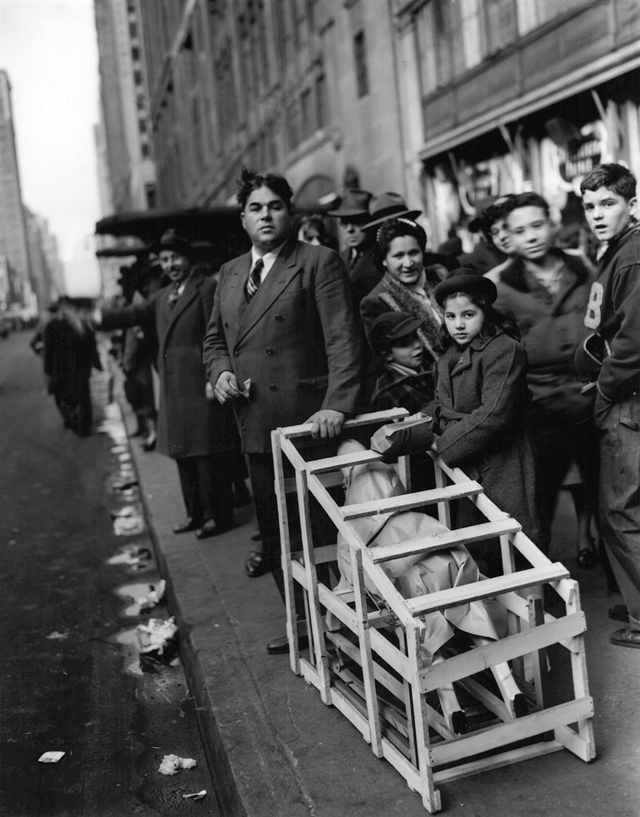
A Christmas Eve shopper with a crated rocking horse tries to hail a cab outside Macy’s department store in New York City on Dec. 24, 1946.
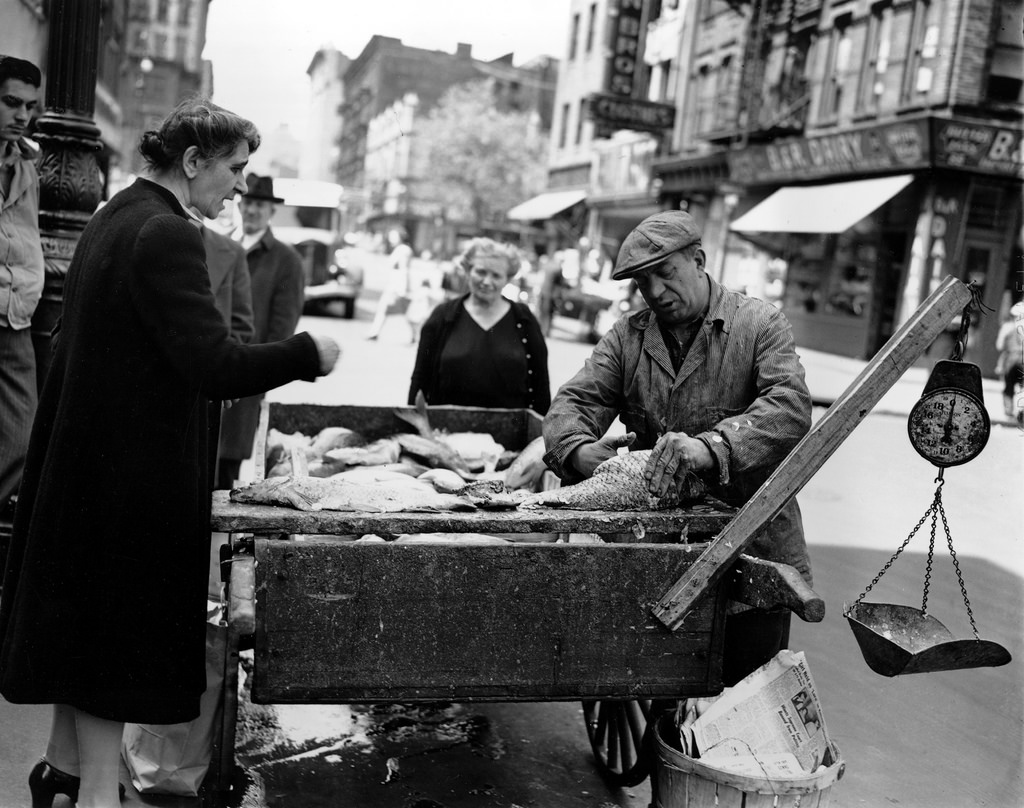
A pushcart vendor cleans fresh fish before weighing it for a customer at the corner of Orchard St. and Stanton in the Jewish section of New York’s Lower East Side, June 1, 1946.

Enticing delicacies on Mulberry Street in Little Italy, in New York, June 1, 1946.
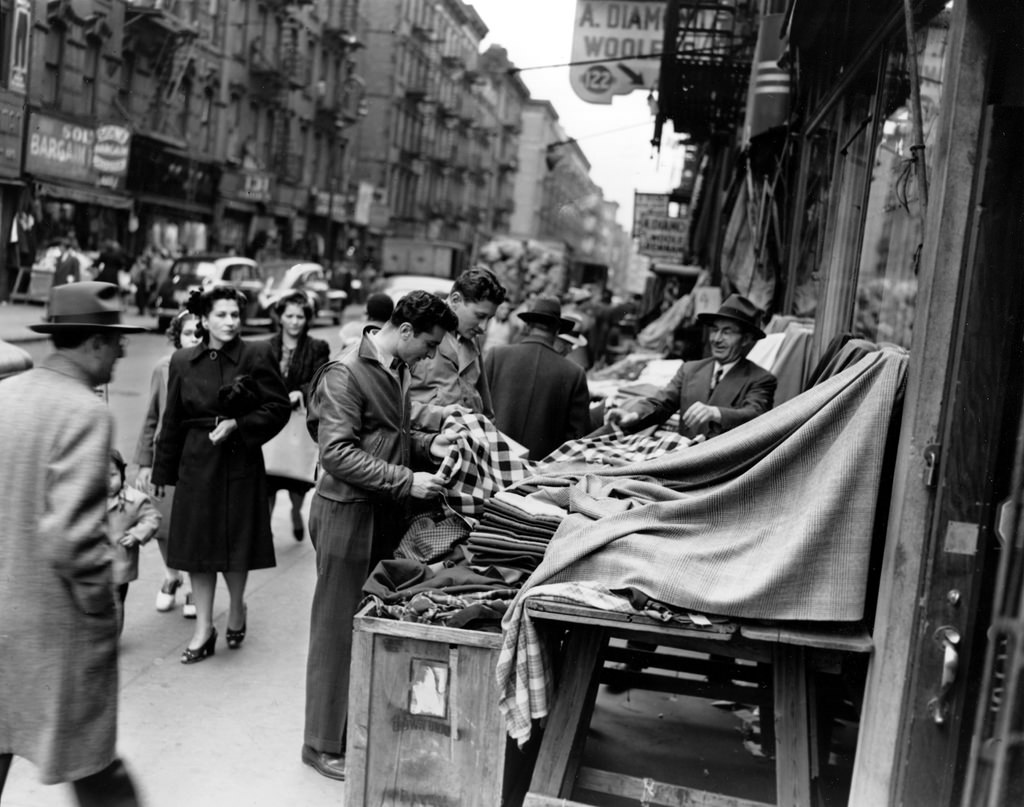
Men stop to look at fabric for sale at an outdoor table in front of a store in New York’s Lower East Side on June 1, 1946.
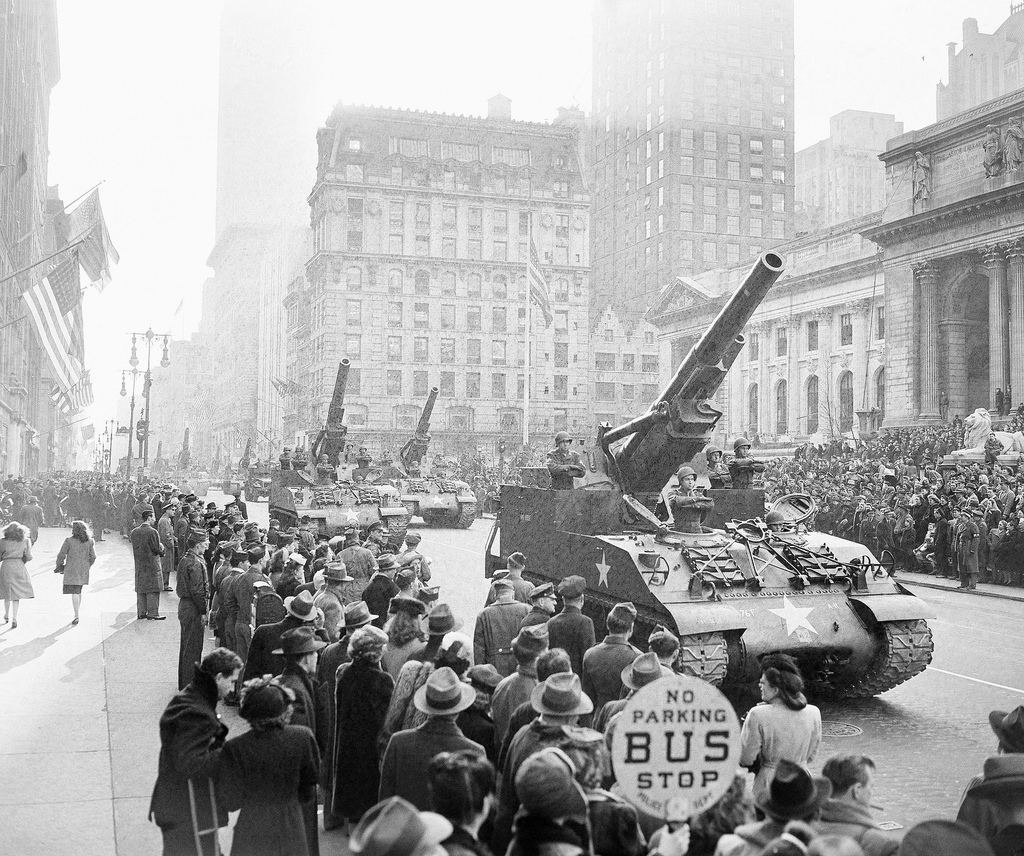
Soldiers stand rigidly at attention in their vehicles which carry 8-inch Howitzers, during the Victory Parade of the 82nd Airborne Division on Fifth Avenue in New York, Jan. 12, 1946.
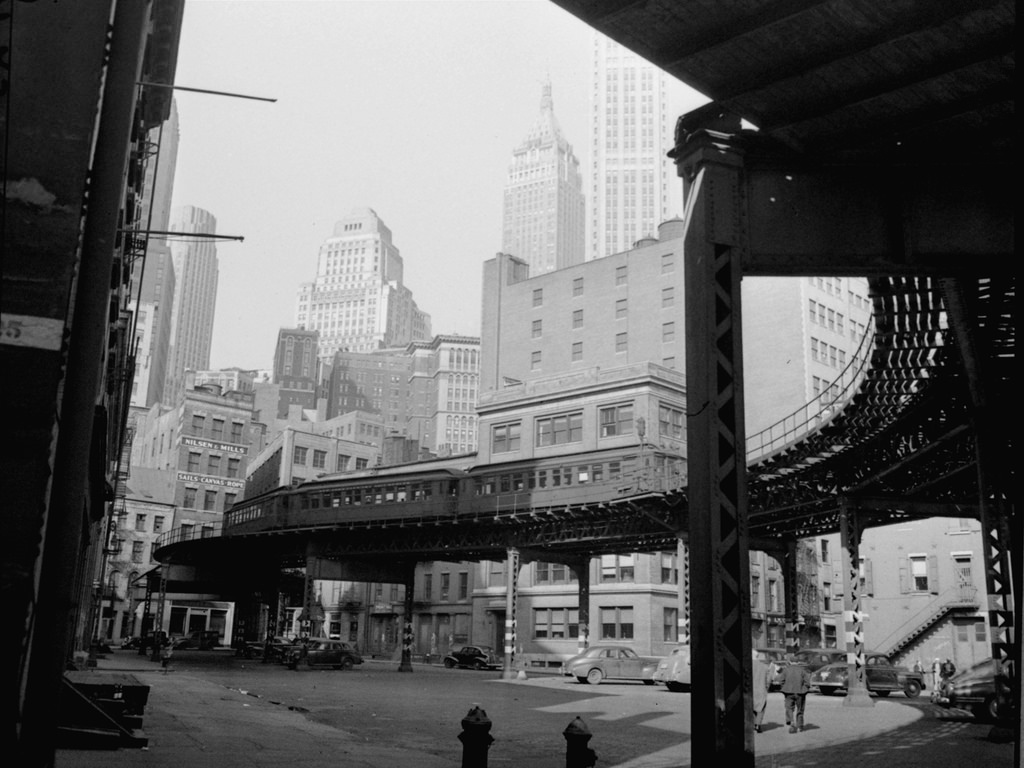
The Third Avenue el winds its way through lower Manhattan, February 12, 1946.
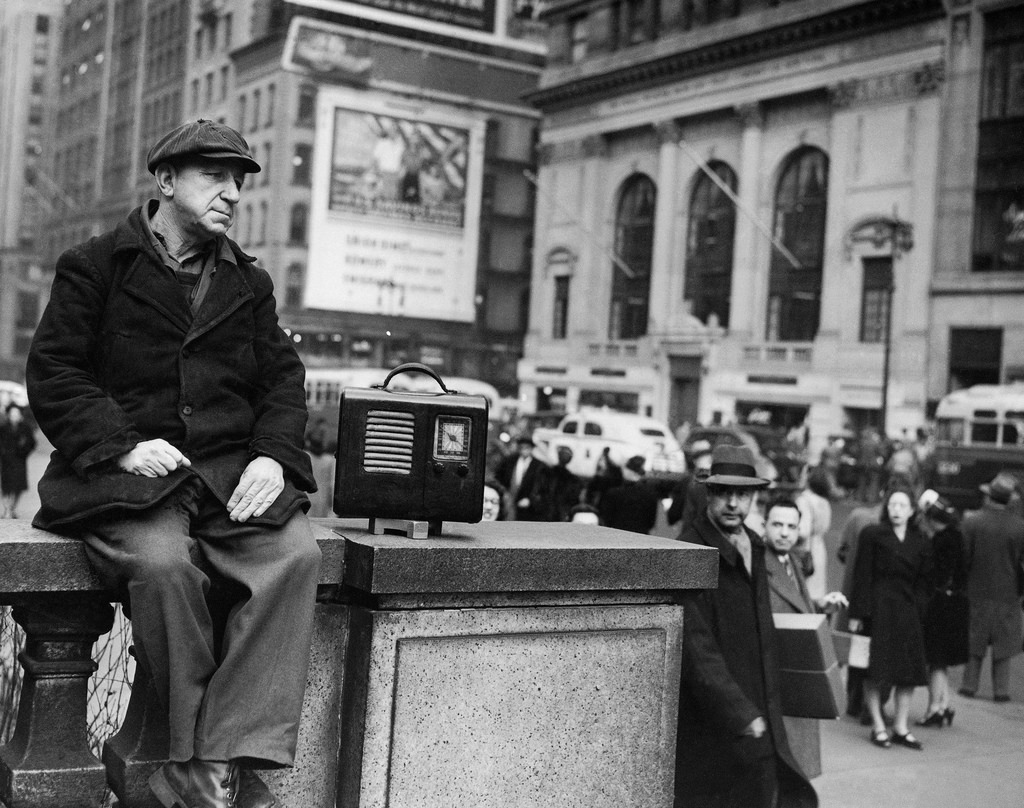
A longshoreman listens to his radio as he sits on the terrace wall in front of the New York Public Library on the corner of 42nd Street in New York January 29, 1947.
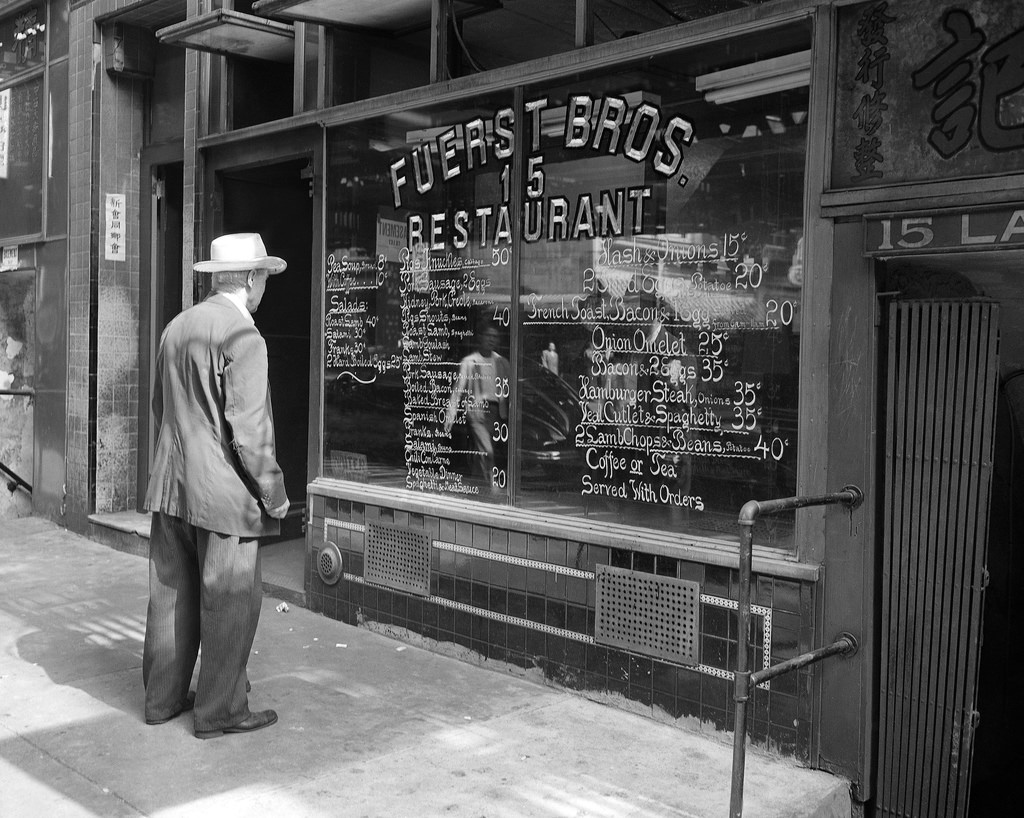
A man stares at the prices scribbled on the window of Bowery restaurant on New York’s Lower East Side, Sept. 26, 1947.
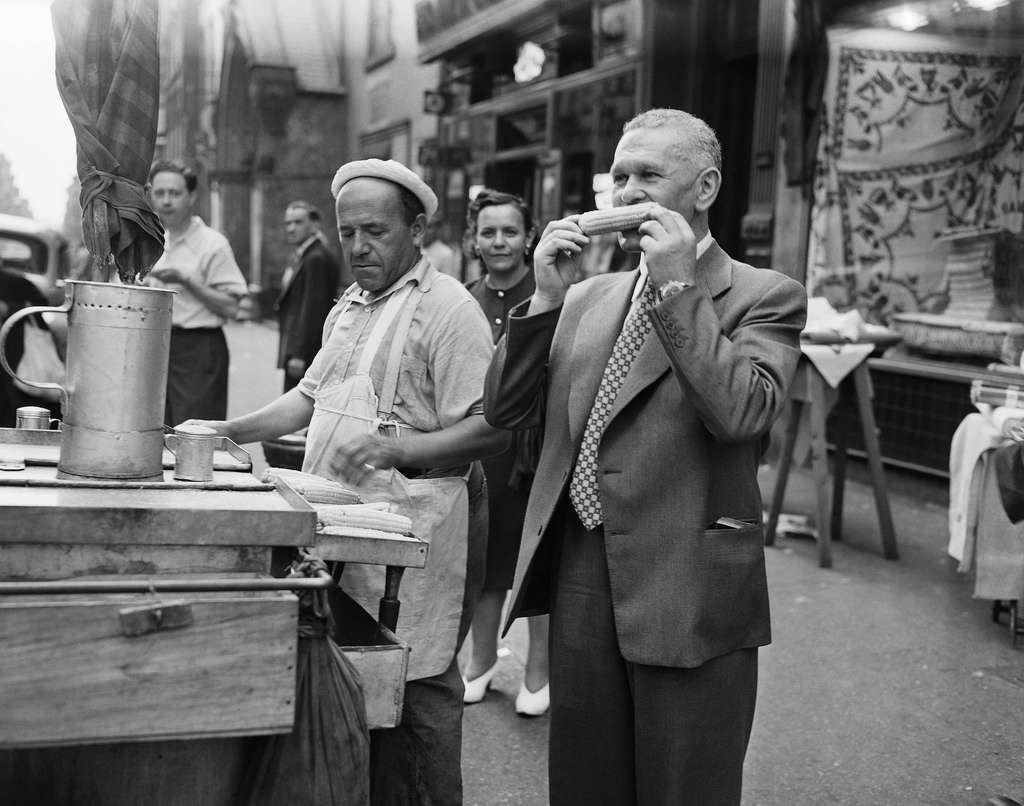
A pedestrian stops and enjoys a hot ear of corn from the vendor in New York, July 14, 1947.
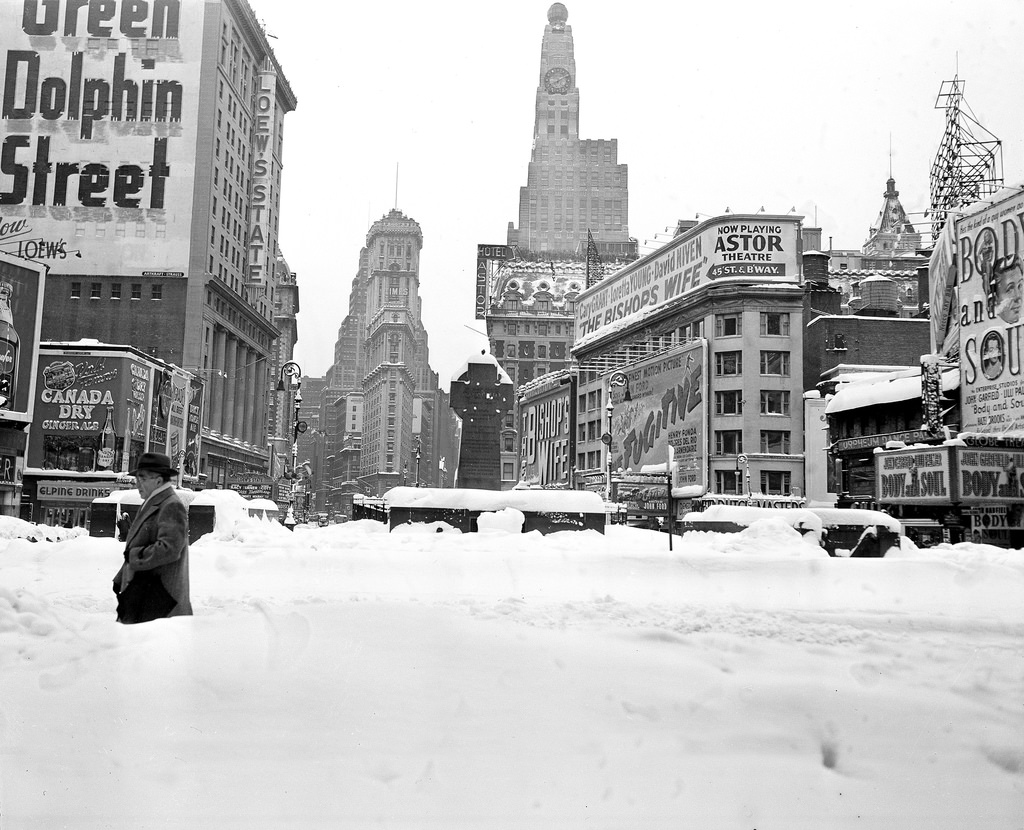
A pedestrian walks between drifts of snow in Times Square, Dec. 27, 1947.
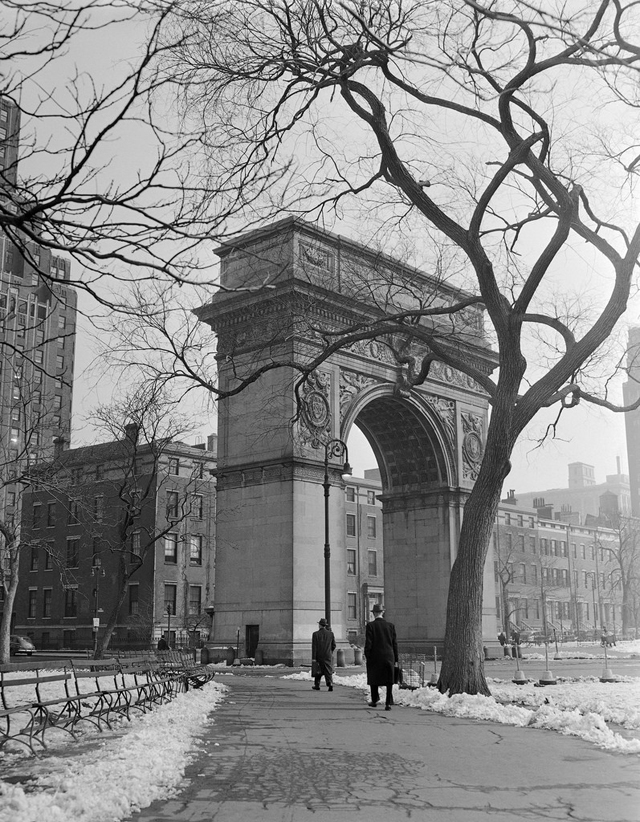
A row of red-brick mansions peek through Washington Square Park’s Washington Arch in New York City’s Greenwich Village on February 25, 1947.

An elderly street merchant wheels his pushcart loaded with crockery slowly along at the corner of Orchard and Delancy Streets on the Lower East Side of New York, July 14, 1947.
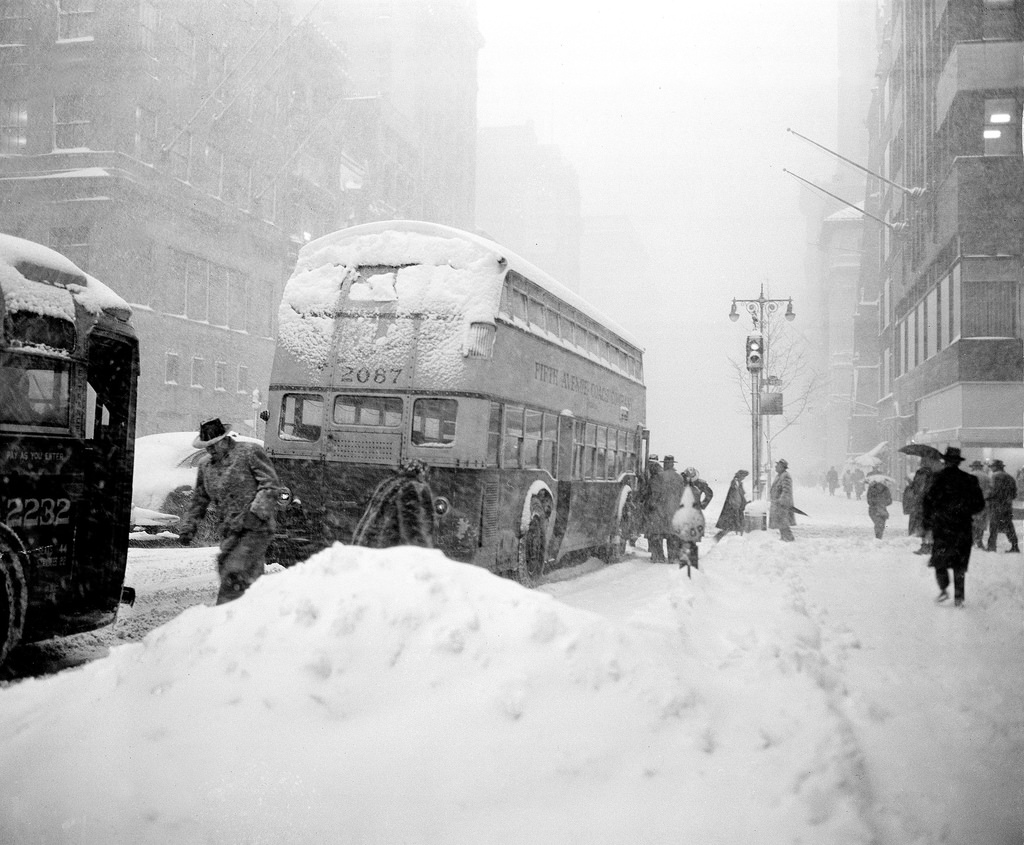
Passengers scurry to buses at 49th Street and Fifth Ave., as snow continues to fall reaching a depth of 10.5 inches, Dec. 26, 1947.
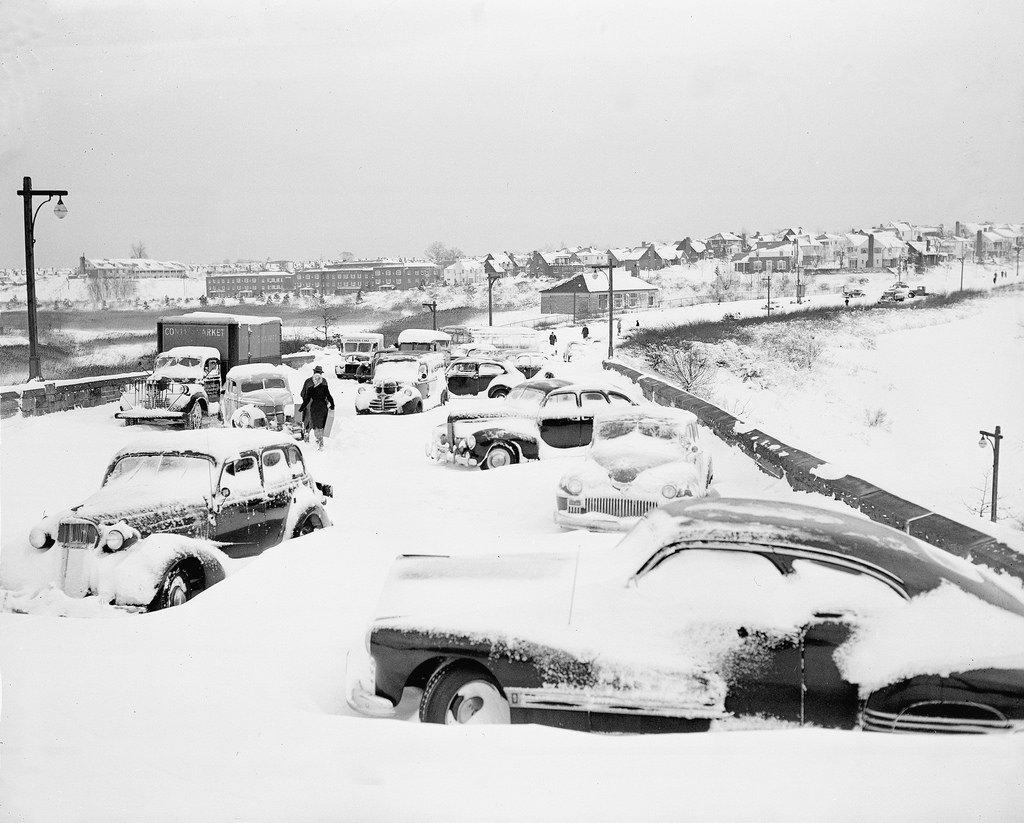
Pedestrians make their way in between cars stalled on the bridge while crossing the Grand Central Parkway at Union Turnpike, Kew Gardens, Queens, Dec. 27, 1947.
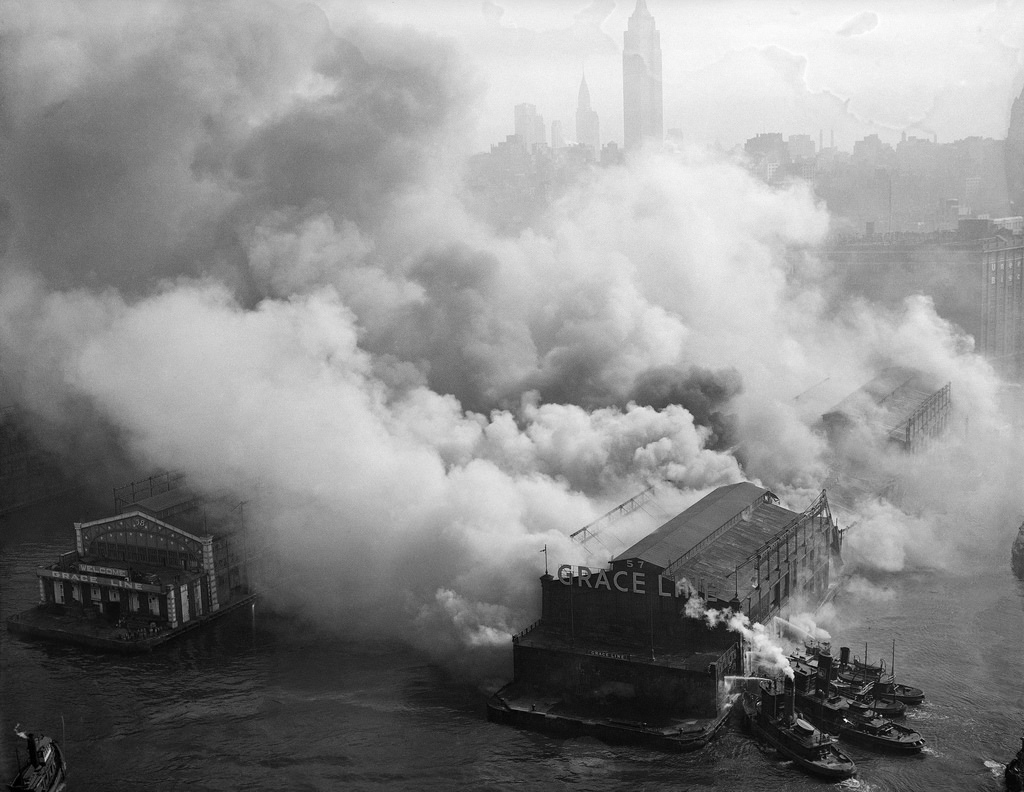
Smoke from a massive fire pours out of Pier 57 on the Hudson River at 15th Street in New York, Sept. 29, 1947.
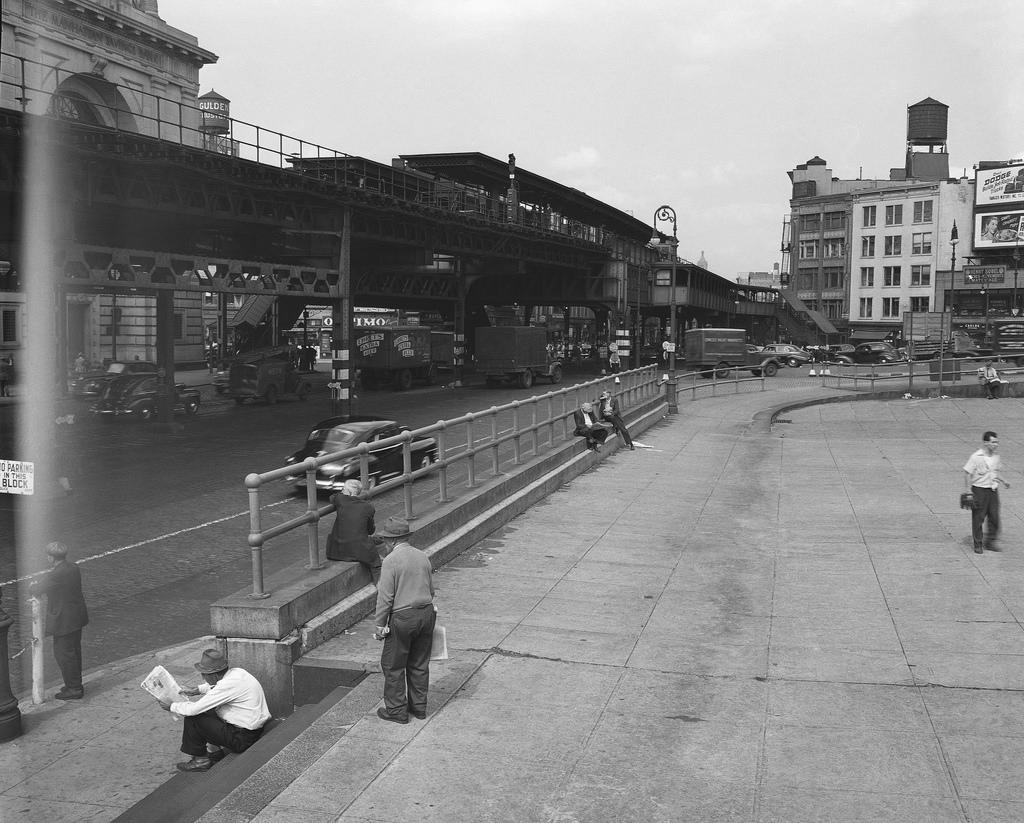
The Bowery where it intersects with Canal Street in New York, 1947.
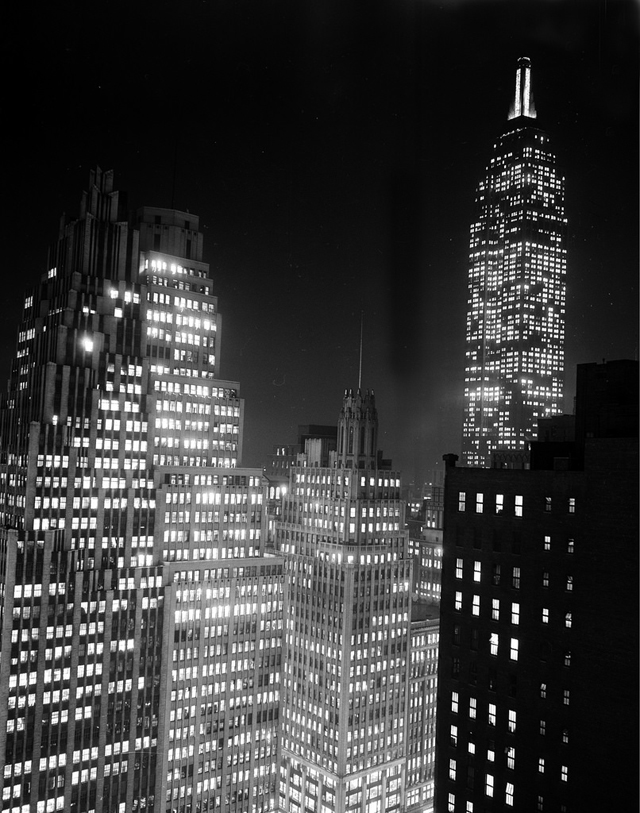
The Empire State Building is seen at right in this aerial view of buildings in Manhattan’s Garment District on Seventh Avenue on Dec. 9, 1947.

The Fulton Fish Market from the corner of Fulton St. looking north, New York City, Jan. 6, 1947.
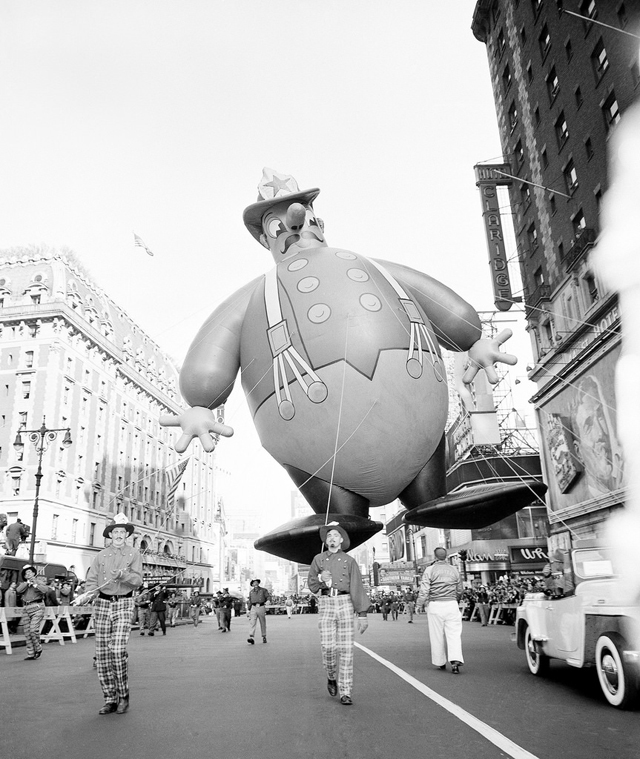
A huge balloon in the form of comic fireman floats over Broadway during the annual Macy’s Thanksgiving Day Parade in New York, Nov. 25, 1948.
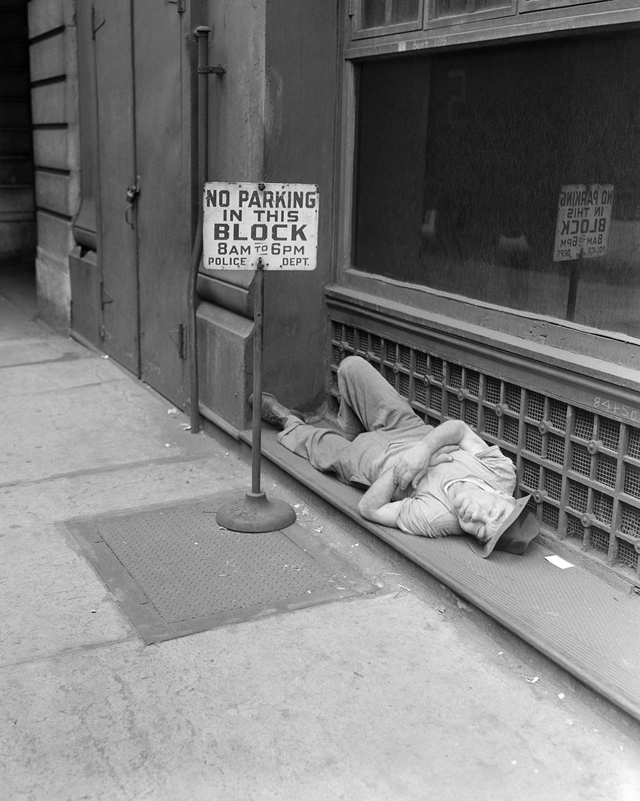
A man takes a nap on the ground in New York, July 17, 1948.
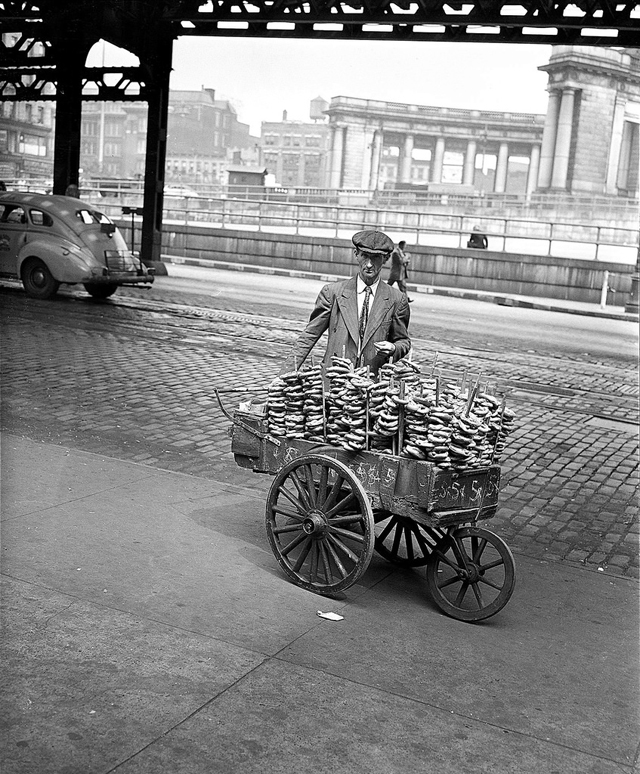
A pretzel vendor displays his wares on an approach to the Manhattan Bridge in New York City, April 29, 1948.
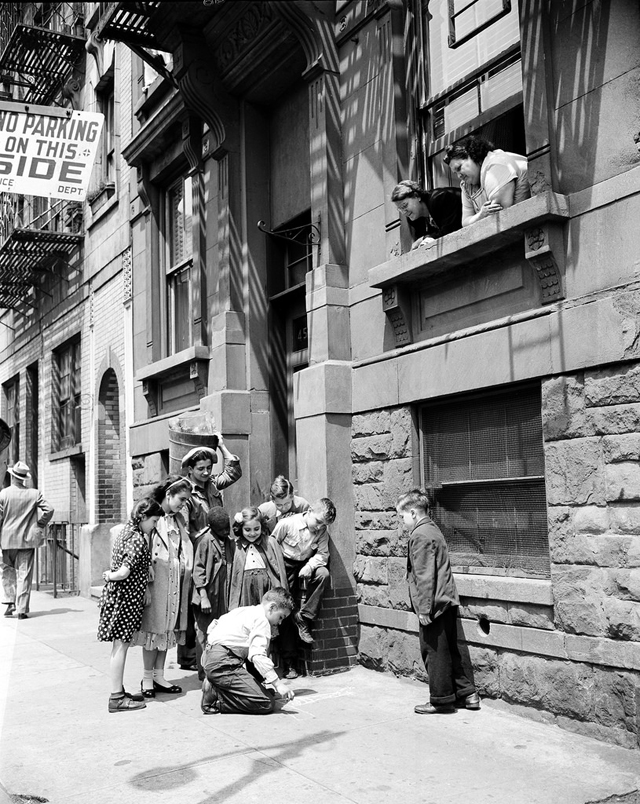
A young boy makes a chalk drawing on the sidewalk in front of a tenement house on 36th Street, NYC, May 12, 1948.

Early morning in the Fulton Fish Market, New York City’s wholesale fish center, on Sept. 5, 1948.
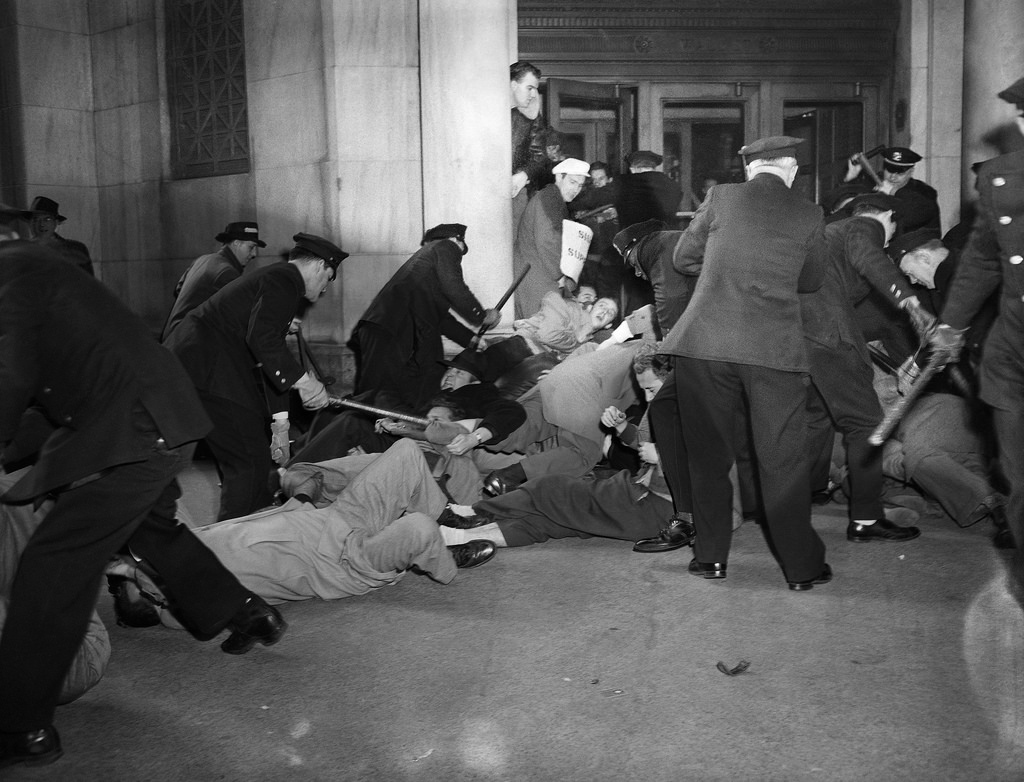
Police and pickets scuffle at the entrance of the New York Stock Exchange at 11 Wall Street in New York, March 30, 1948.
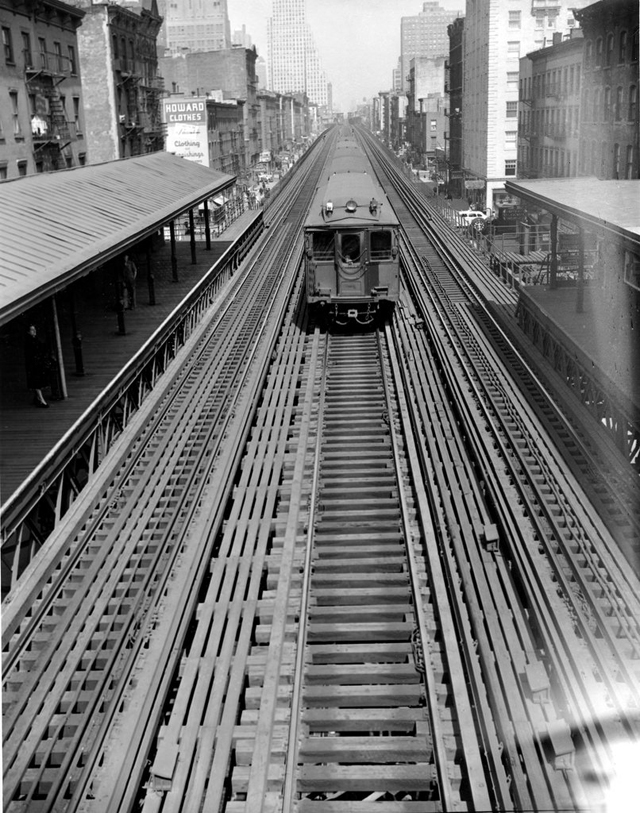
The bridge crossing over the East 34th Street station, looks north over the Third Avenue Line El train, New York City, 1948.
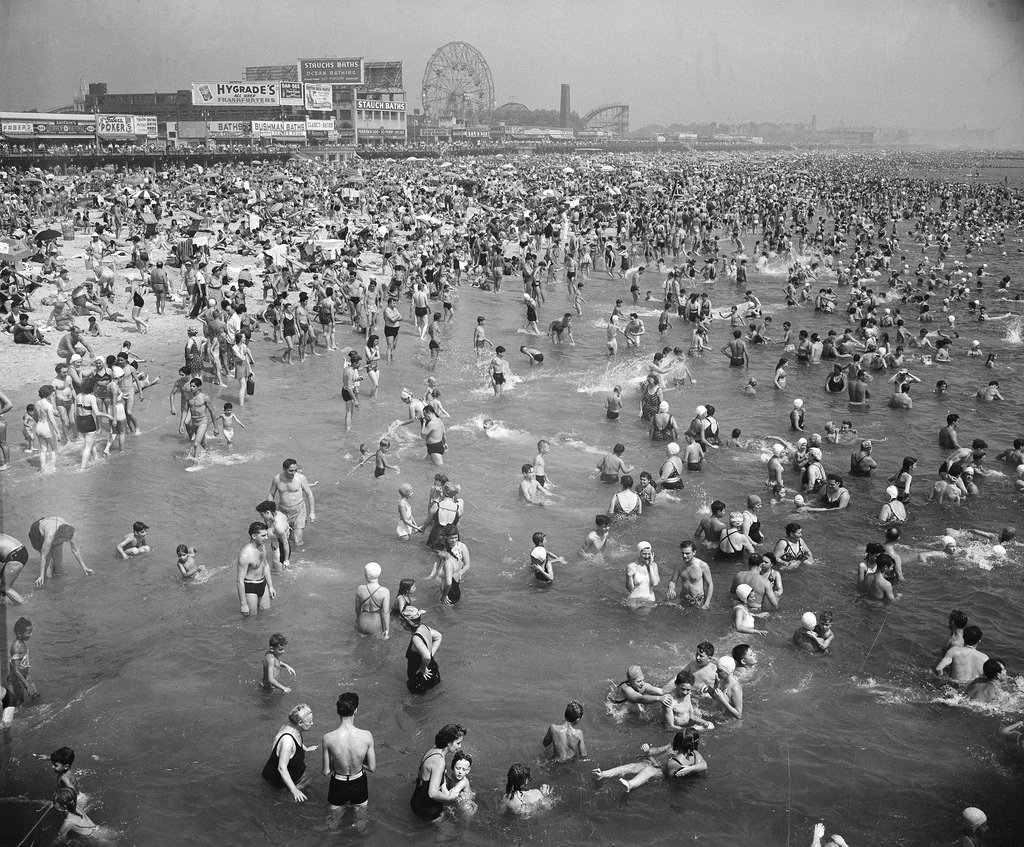
The crowded beach at Coney Island in Brooklyn, Aug. 28, 1948.
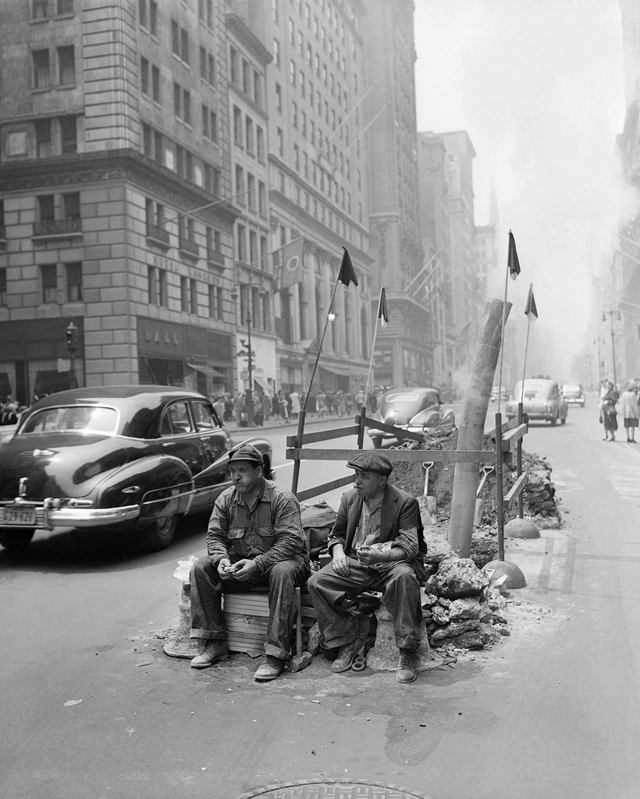
Two workmen eat their lunch beside their excavation on fashionable Fifth Avenue between 56th and 57th Streets in New York, June 8, 1948.
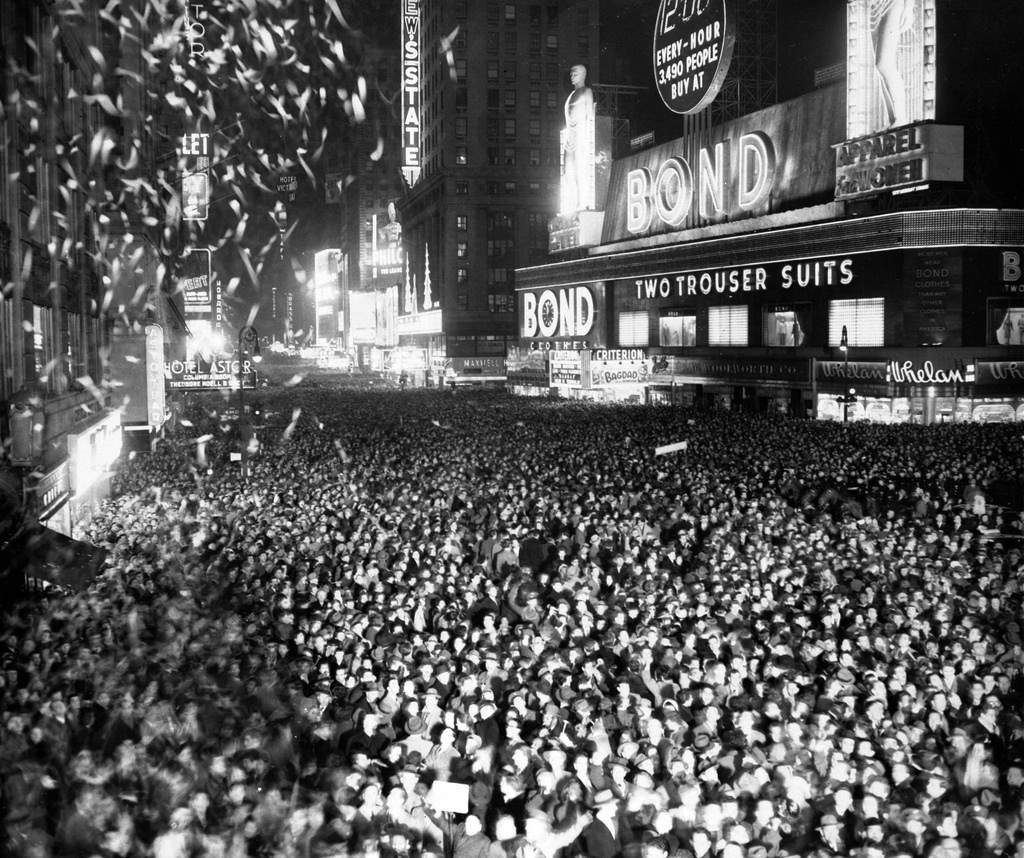
People crowd into Times Square, in New York, on Dec. 31, 1949, to welcome the New Year.
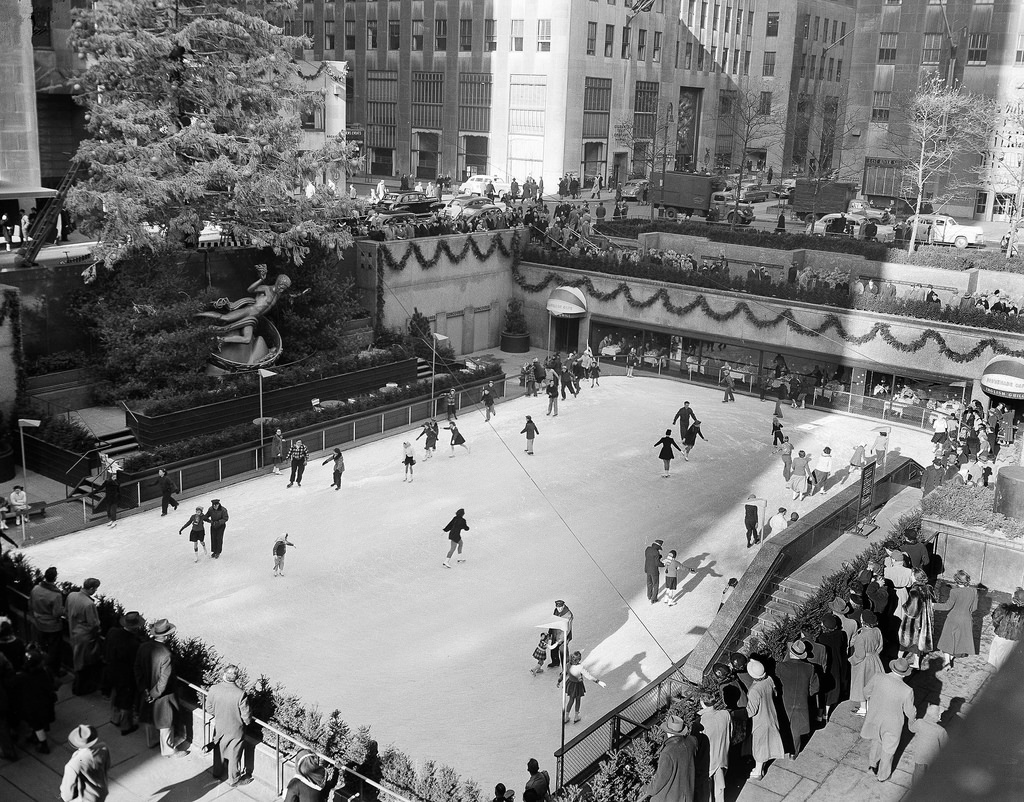
Skaters glide on the ice at the center’s skating rink in midtown Manhattan, New York, Dec. 8, 1949.
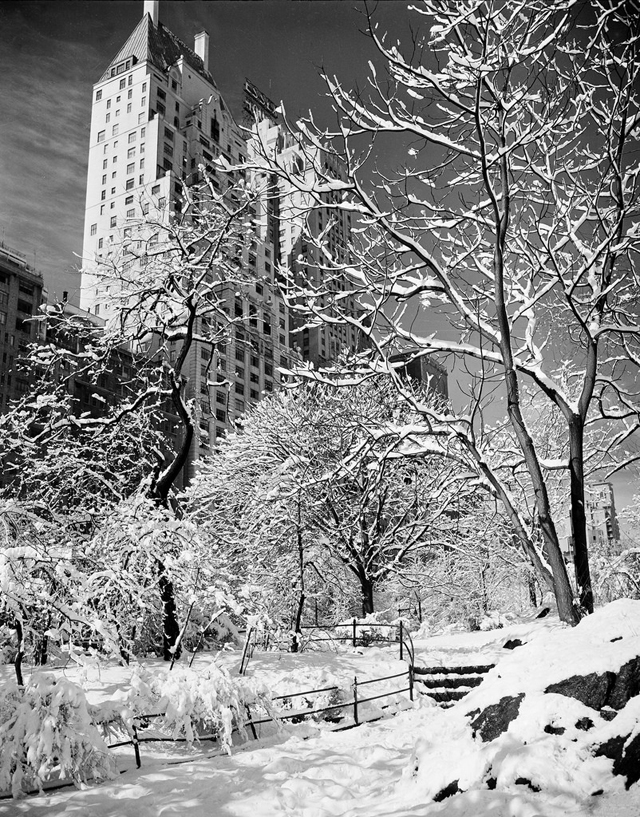
Snow-covered trees in Central Park are seen against the Essex House building on Central Park South, NYC, March 1, 1949.
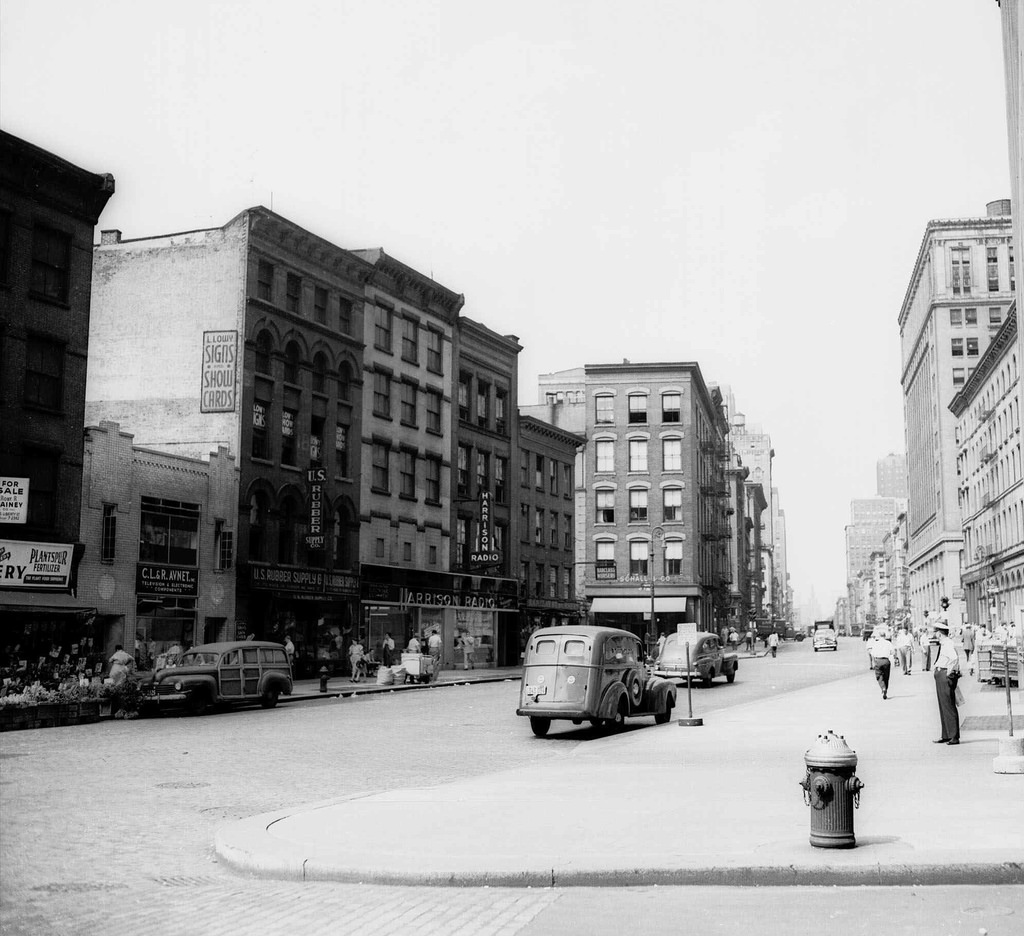
West Broadway looking north from Vesey Street in New York City on July 21, 1949.
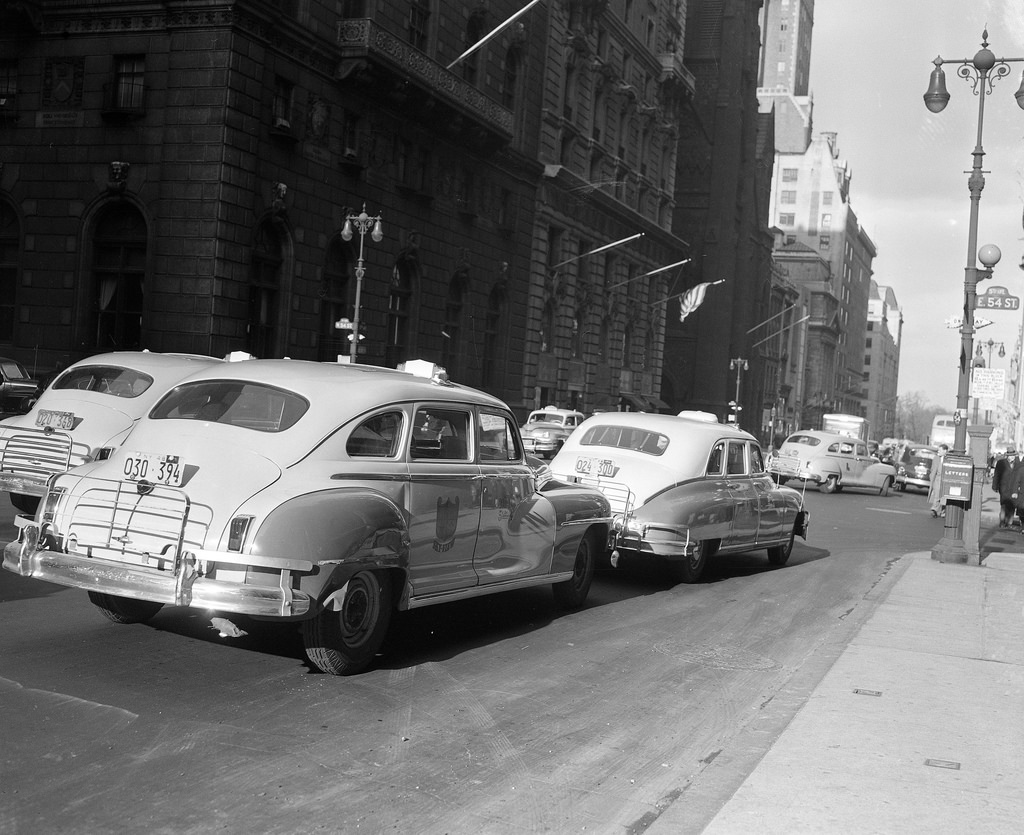
Yellow cabs line New York’s Fifth Avenue, Jan. 15, 1949.
(Photo credit: Library of Congress / New York City Library / Wikimedia Commons / PBS: The Center of the World: New York, A Documentary Film).
Updated on: September 23, 2024
Any factual error or typo? Let us know.



